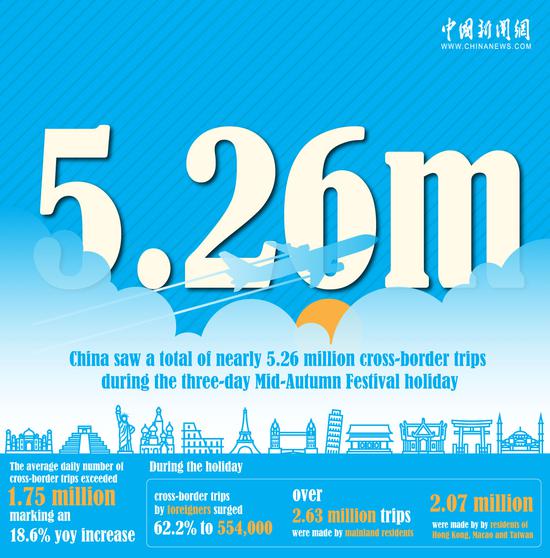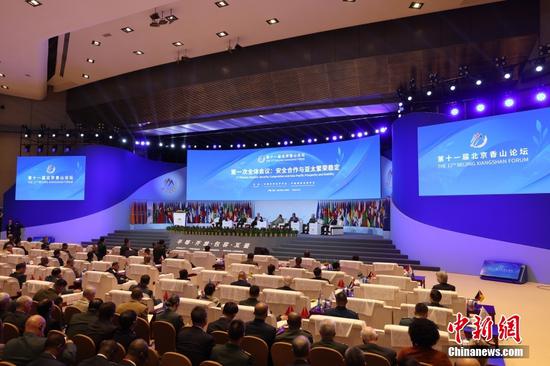In early March, my college classmate, who now works at a foreign trade company in Cixi, Zhejiang province, booked a two-night stay at a hotel in Singapore to attend a Taylor Swift concert.
It wasn't just the people sitting in the same row of the plane who were headed to the concert at the Southeast Asian country's national stadium. She quickly noticed that many passengers on her flight were also going to watch the show, as they all talked about the same topic on board.
Many of them bought sequin dresses in China before the departure and made friendship bracelets. Young people also joined with fans from other parts of the world to attend pre-concert meetups, tailgating events or hanging out at nearby restaurants and bars to share the excitement.
This highlights a broader trend within China's rapidly growing trade in services sector, particularly in areas like tourism and cultural experiences.
As disposable incomes rise and the demand for international events and services increases, more Chinese consumers are traveling abroad, not only for business, but also for leisure activities.
This surge in outbound tourism reflects the broader expansion of China's services sector. It has seen significant growth in areas like tourism, logistics and professional services, becoming an integral part of the nation's economic transformation.
China's travel services continued to grow at a high rate in the first seven months of 2024, with revenue in the sector reaching 1.14 trillion yuan ($161.5 billion), an increase of 48.5 percent year-on-year. This made it the largest sector in China's trade in services, statistics from the Ministry of Commerce showed.
The rapid growth of China's travel services sector, driven by rising disposable incomes and increasing demand for international events, brings significant benefits to the global economy.
As more Chinese consumers travel abroad for leisure, such as outdoor activities and cultural events, they contribute to the economies of the destination countries.
The influx of Chinese tourists can boost local businesses, including hospitality, retail, aviation, cruises and entertainment events, driving demand for various products and creating job opportunities.
Moreover, Chinese outbound tourism fosters cross-cultural exchanges and strengthens global economic ties, particularly in countries heavily reliant on tourism revenue. Destinations in Southeast Asia, Europe and North America, in particular, benefit from increased spending on accommodation, dining and shopping by Chinese tourists.
The surge in international travel also highlights the importance of global cooperation in catering businesses, logistics and infrastructure, as it demands efficient transportation networks and cross-border services.
For example, Chinese companies such as State-owned China Railway Construction Corp and China Communications Construction Co have all undertaken railroad and airport construction projects in numerous countries in Africa, Southeast Asia and the Middle East.
As China expands its trade in services, this deeper integration into the global economy strengthens trade partnerships, drives growth in related industries and contributes to the overall development of a more interconnected global services market.
Based on these facts, the next growth stage of China's outbound tourism market could be characterized by increased demand for more personalized, high-quality travel experiences, as well as a shift toward niche segments such as eco-tourism, adventure travel, sport tourism and cultural exploration.
As Chinese consumers become more affluent and sophisticated, they are seeking unique and immersive experiences rather than standard group tours. This transition is likely to drive the development of luxury travel, high-end food and wine tasting, wellness tourism and specialized services tailored to individual preferences, providing opportunities for destinations and service providers to cater to this evolving market.
Another key trend in the next phase of China's outbound tourism will be the expansion into lesser-known and visa-free destinations, beyond the traditional hotspots in Southeast Asia and Europe. Chinese tourists will increasingly explore regions like Africa, the Middle East, South America and Central Asia, offering these emerging markets the chance to tap into a lucrative source of tourism revenue.
For the global economy, this evolution in China's outbound tourism means increased demand for diversified services that will spur investment in infrastructure, technology and sustainable initiatives in tourism-heavy regions.


















































 京公网安备 11010202009201号
京公网安备 11010202009201号